If there’s one childhood toy that’s instantly recognised across all generations, it’s Barbie.
As a child, I had my fair share of Barbie dolls, and many happy afternoons were spent sprawled on my bedroom floor, deep in imaginative play. While it’s easy to dismiss a plastic doll as a mere frivolity, when you grow up in a world that often portrayed men as the breadwinner, there’s something special about Barbie’s ability to be and do, well, almost anything.
According to Mattel, Barbie has had over 200 careers to date. Sure, there was Disco Barbie and Princess Barbie, but she was also a teacher, nurse, robotics engineer and—for a brief period in the early nineties—a presidential candidate. Beneath the perfect hair, she embodies an often neglected truth about women: that we’re capable of contributing to the good of society, in a multitude of ways.
This is certainly true in places where Baptist World Aid’s Partners serve. Our local Christian Partners work with hundreds of women who take on a variety of roles, often at the same time. And unlike Barbie, their contribution isn’t just a fancy outfit change. It’s creating tangible, long-lasting change—for their families, and their communities.
Here are just six of the many roles women play in low-income countries, and how our Partners are supporting them in their work.
Community Leader
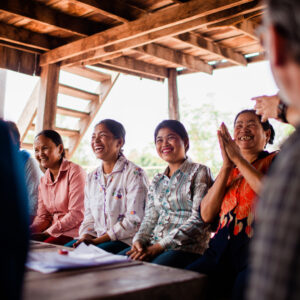
When women are given leadership roles in their community, change isn’t far behind. In one Cambodian village, babies and children were constantly sick due to poor hygiene, and preventable diseases such as malaria were rife.
Our Partner trained a group of four women on hygienic practices, rubbish management, safe and hygienic breast feeding, and healthy eating. The women started sharing their knowledge with others in the community. As a result, malaria cases have dropped by 75 per cent, and more children are well enough to attend school. ‘These women are leaders,’ our Partner said. ‘People look to them for help.’
Entrepreneur
Around the world, our Partners are supporting female entrepreneurs like Champa, helping them grow thriving businesses to secure their families’ long-term future.
A grandmother living in Nepal, Champa was 48 and recovering from an accident when she first had the idea to start her own shop. Our Partners supported her efforts, and before long, she was making a steady profit with her first stall. She has since invested in a second shop, and is much more self-sufficient. ‘When I, or my children, get sick, I can just pay for [what’s needed] myself,’ Champa said.
Teacher
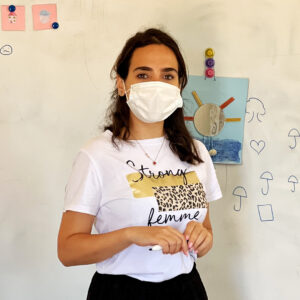
Where our Partners serve, women teach a wide range of disciplines—from literacy and healthcare to textiles, child rights, and business skills.
Rima was about to go to university in Istanbul when economic collapse in Lebanon meant she had to return home and help support her family. Feeling at a loss, she took a job at our Partner’s education centre, teaching children from marginalised communities. ‘My mission now is to teach them how important they are . . . and be proud of their accomplishments throughout the academic year,’ Rima said. ‘With the ability to read and write, they can aspire for more.’
Advocate
Women from all walks of life are standing up for people’s rights. One example is Sunita, a leader in our Partner’s youth club.
Sunita lives in rural Nepal, where one in three girls are married before they turn 18. When Sunita’s 16-year-old sister was going to be given away in child marriage, she fought to stop it. Sunita spoke up to her parents, with the support of her youth club. For two months, they petitioned her parents to stop the marriage. Thankfully, they were successful. Sunita’s sister finished her education, and now designs and sells dresses, generating income for herself and her parents.
Farmer
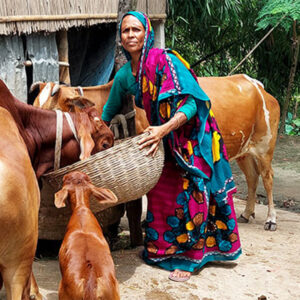
For many women, farming land takes pride of place, as it enables them to feed their families and earn an income.
Soneka, a widow and mother, inherited a plot of land in Bangladesh. She was producing only a small quantity of vegetables, but this changed when she received training from our Partner. ‘They helped me increase my yields, improve the quality of my crops, and ultimately be better equipped to negotiate for better prices,’ Soneka said.
Soneka increased her farm’s net return by 75 per cent using the techniques she learned. She has rented more land, and continues to provide for her family.
Carer of Children
Living in Uganda, Susan was determined to give her children a great childhood, but poverty and lack of support made this difficult. So, Susan joined our Partner’s self-help group, and learned how to better meet her children’s needs. ‘When I have a challenge, I can easily reach out to my group members who suggest possible solutions,’ Susan said. ‘I now know children’s rights, and how to protect my children.’
Recently, Susan accessed seed funding through the group to start her own produce business. ‘I’ve been able to buy basic items for my household, and contribute towards school fees,’ she said.
Women today perform a multitude of roles and carry huge responsibilities. In the communities we support, across the globe women are creating change that has a lasting impact on not only their immediate families, but their wider community. If you’d like to support women like those featured here, visit Where It’s Needed Most to donate to the great work of our Christian Partners.

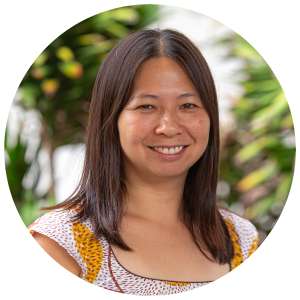

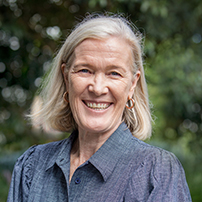 Melissa Lipsett,
Melissa Lipsett,

 Heather Keith,
Heather Keith,